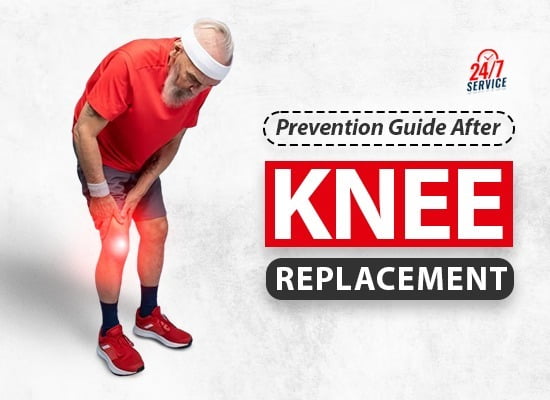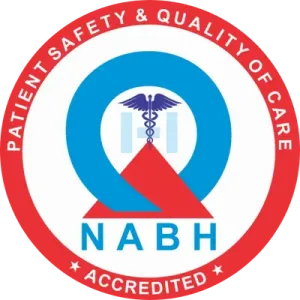Preventing Complications After Knee Replacement: A Comprehensive Guide
Knee replacement surgery is a significant procedure that offers relief to individuals grappling with severe joint pain and limited mobility. However, like any surgical intervention, it carries potential risks and complications. Understanding these risks and taking proactive steps to prevent complications is crucial for a successful recovery and improved long-term outcomes.
Recognizing Potential Complications
Before discussing prevention strategies, it’s essential to understand the possible complications associated with knee replacement surgery:

Infection: Post-operative infections at the surgical site can lead to severe complications if not addressed promptly. To mitigate this risk, stringent sterile techniques are employed during surgery, and antibiotics are administered as necessary to prevent infections. At Mukat Hospital modern state-of-art operation theatre is available to minimise infection.
Blood Clots: Reduced mobility post-surgery increases the risk of blood clots like deep vein thrombosis (DVT) or pulmonary embolism (PE). To combat this, patients are encouraged to engage in specific exercises, and appropriate blood thinners are prescribed to prevent clot formation. Early mobilisation with walking same day evening or next morning recommended.
Implant Issues: Complications such as dislocation, loosening, or wearing out of the artificial knee joint may lead to pain or instability. Mukat Hospital utilises advanced surgical techniques and high-quality implants to minimise these risks. Implants with maximum abrasive resistance are used.
Stiffness and Reduced Range of Motion: In some cases, patients might experience stiffness or limited movement post-surgery. To prevent this, a comprehensive physical therapy regimen is implemented immediately after the procedure to promote flexibility and mobility.
Prevention Strategies
Pre-operative Preparations:
Health Assessment: A thorough evaluation of a patient’s health before surgery helps identify and address potential risks. This assessment involves blood tests, imaging, cardiac evaluation for every patient and discussions about medical history to ensure optimal preparation.
Infection Prevention: Mukat Hospital strictly adheres to rigorous infection control protocols during surgery. This includes maintaining a sterile environment and administering antibiotics to minimise the risk of post-operative infections.
During Hospital Stay:
Physical Therapy: Immediate mobilisation and guided exercises by experienced physiotherapists at Mukat Hospital help prevent stiffness and enhance mobility. Patients are encouraged to engage in specific exercises tailored to their recovery needs.
Medication and Blood Thinners: Properly prescribed medication and blood thinners are administered to reduce the risk of blood clots post-surgery. Mukat Hospital ensures a personalised medication regimen based on individual patient needs and risks.
Proper Wound Care: Following stringent wound care protocols is vital in minimising the risk of infections. Mukat Hospital provides detailed instructions on wound care post-surgery to prevent any complications.
Post-discharge Care:
Home Exercise Program: Mukat Hospital designs and provides patients with a structured home exercise program aimed at continuing the rehabilitation process. This program is tailored to individual needs to ensure a quicker and more effective recovery.
Follow-up Appointments: Minimum follow up is required after good care at hospital. However, Our team is available to hear any concerns even after discharge.
Healthy Lifestyle: Mukat Hospital emphasises the importance of maintaining a healthy weight and lifestyle post-surgery. This includes a balanced diet and regular exercise to support the longevity of the artificial knee joint.
Mukat Hospital's Approach:
Patient Education: Comprehensive information is provided to patients pre- and post-surgery, empowering them to actively participate in their recovery. This includes detailed discussions about the surgery, rehabilitation process, and potential complications.
Rehabilitation Services: Our dedicated team of physiotherapists at Mukat Hospital works closely with patients to create customised rehabilitation programs. These programs focus on specific exercises and therapies tailored to individual needs for a quicker and more effective recovery.
Regular Monitoring: Post-discharge, we maintain regular follow-ups to monitor progress and address any concerns promptly. This continuous monitoring ensures that any complications or issues are identified and managed effectively.
Advanced Techniques: Mukat Hospital employs advanced surgical techniques and utilises state-of-the-art technology to minimise complications during and after surgery. This includes precision in implant placement and minimising tissue trauma during the procedure.
Conclusion:
Knee replacement surgery offers immense relief and improved quality of life for individuals suffering from chronic knee pain. However, it’s crucial to acknowledge and address the potential complications associated with the procedure.
At Mukat Hospital, we’re committed to not just performing surgeries but ensuring our patients experience a smoother and more comfortable recovery, enabling them to regain mobility and lead fulfilling lives post-surgery.
If you’re considering knee replacement surgery or seeking further information on preventing complications post-surgery, our team at Mukat Hospital is here to provide expert guidance and support tailored to your needs.











